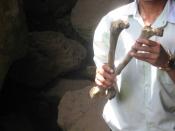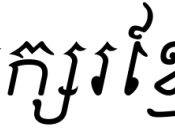"There is nothing left," the words uttered by a young Cambodian civilian known as Vithy. In the novel, Little Brother by Allan Baillie, it is evident that war has devastating and lasting effects on civilians. These three occurrences are clearly manifested in the novel. They are: Loss of family, Loss of property and Genocide. The most terrifying thing of all is that children, such as Vithy, went through these traumatic things.
Firstly, war has devastating and lasting effects on civilians because of loss of family. Vithy experienced the loss of family due to war. He was separated from his parents and his younger sister, Sorei. His father and his sister were murdered because they were educated and his mother died of starvation because she gave her food to Sorei. "My sister, Sorei, was taken away because she told a soldier she knew how to read and do sums." No one saw her again.
"My mother died from starvation because she had given up all her food to Sorei." Many other Cambodian civilians experienced the loss of family due to war. The King did not have a family due to the Khmer Rouge and the war and all the people that stay with Ponary are displaced family members. Thus, family loss because of war has devastating and lasting effects on civilians.
Secondly, war has devastating and lasting effects on civilians because of loss of property. "No one owns anything anymore," is one example of this. Another example is the King in Phnom Penh. Phnom Penh was ruled by the government. Now due to the war, a young boy, is now known as the King of the city. Also a boy with a cyclo gave Vithy permission to go to an automobile junkyard that did not even belong to him. Many
In the novel Little Brother (hereafter LB) the author, Allan Baillie, tells a story of war and how it affects children. The main protagonist, Vithy, and eleven year old boy, struggles to make his way to the border, on his way encountering many difficulties like hunger, the harsh rules that have to be followed to live, loss of family and the harsh things that war makes people go through and do to live.
Driven by a slim promise of safety plus the hope of finding his older brother Mang, 11-year-old orphan Muong Vithy makes his way across hundreds of miles of war-torn Cambodia to the Thai border, relying on his wits and the kindness of strangers to stay alive, evading the dreaded Khmer Rouge, and finding at last a chance for a new life in a distant country. Having passed through modern Phnom Penh and ancient Angkor Wat and finding both equally haunted, Vithy reaches Thailand. There, he meets Betty Harris, an Australian doctor, and begins to search for his brother, the last member of his family seen alive. Finally giving Mang up for dead, Vithy agrees to go with Harris to Australia--where he joyfully finds his brother awaiting him at the Sydney airport. The atrocities and privations that make Wartski's Boat to Nowhere (1980) and other refugee stories so searing are kept offstage here; this is a milder narrative (with something of a fairy-tale ending), but Baillie keeps the plot moving and his characters are deftly drawn and believable.


